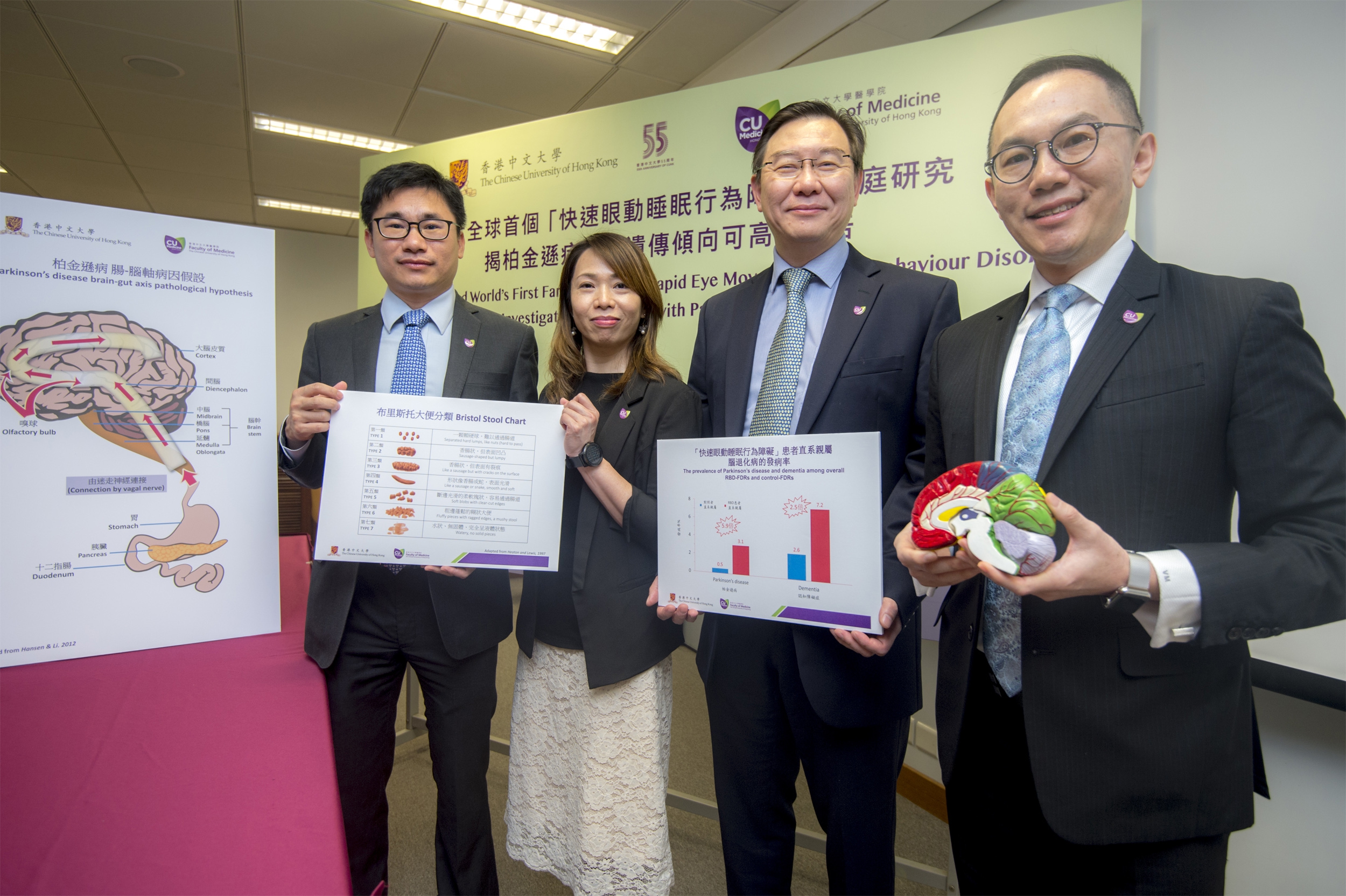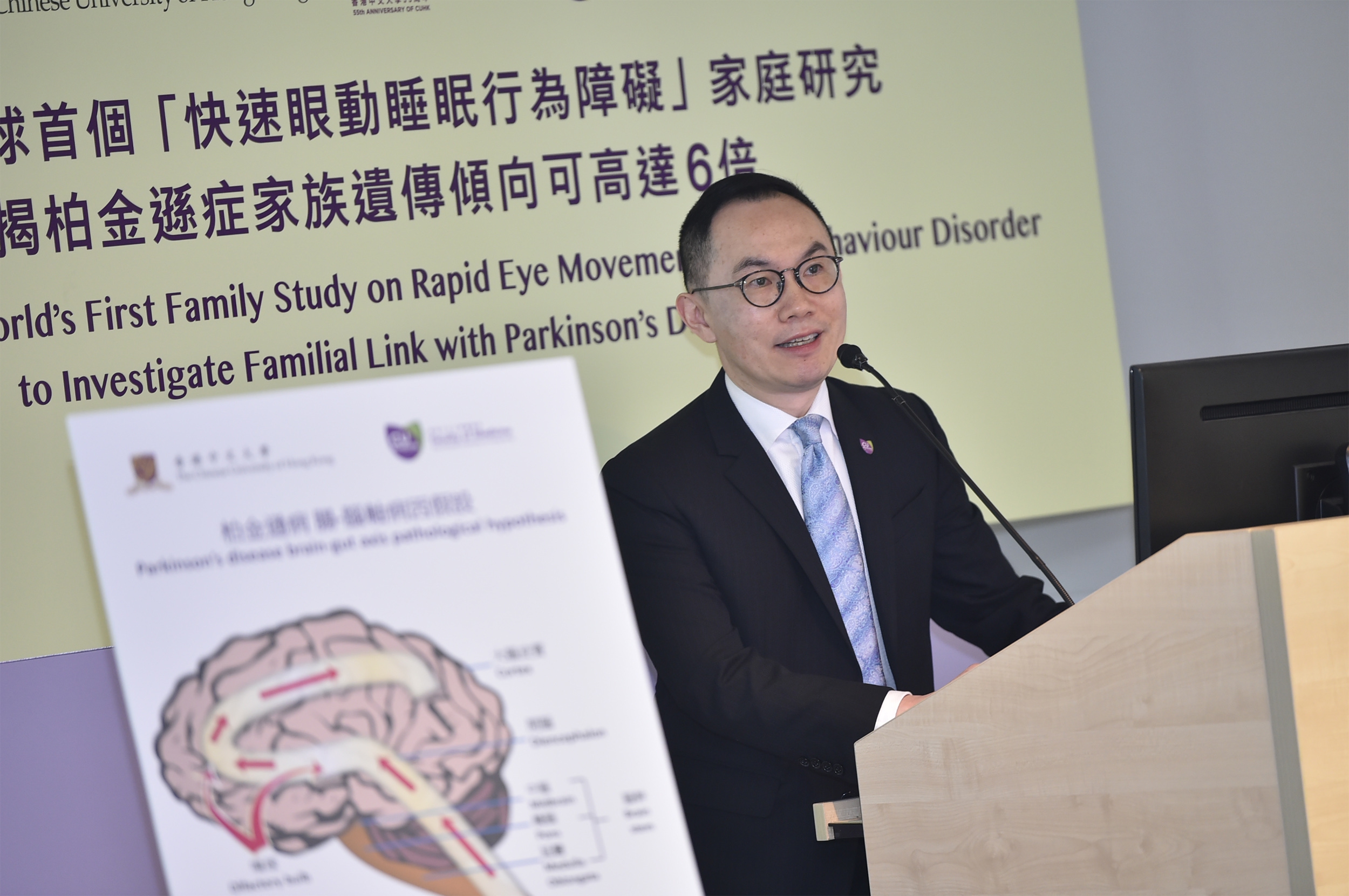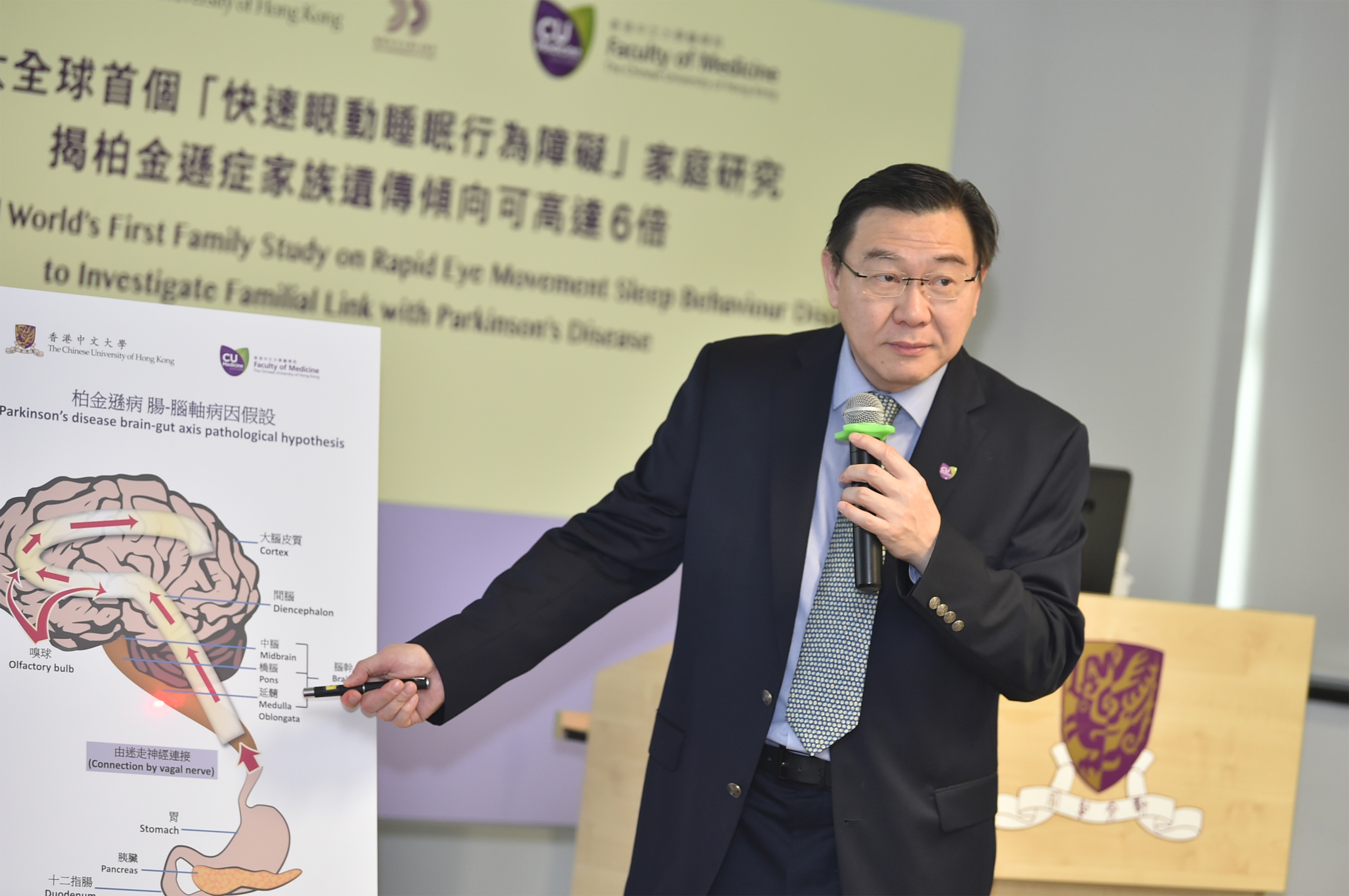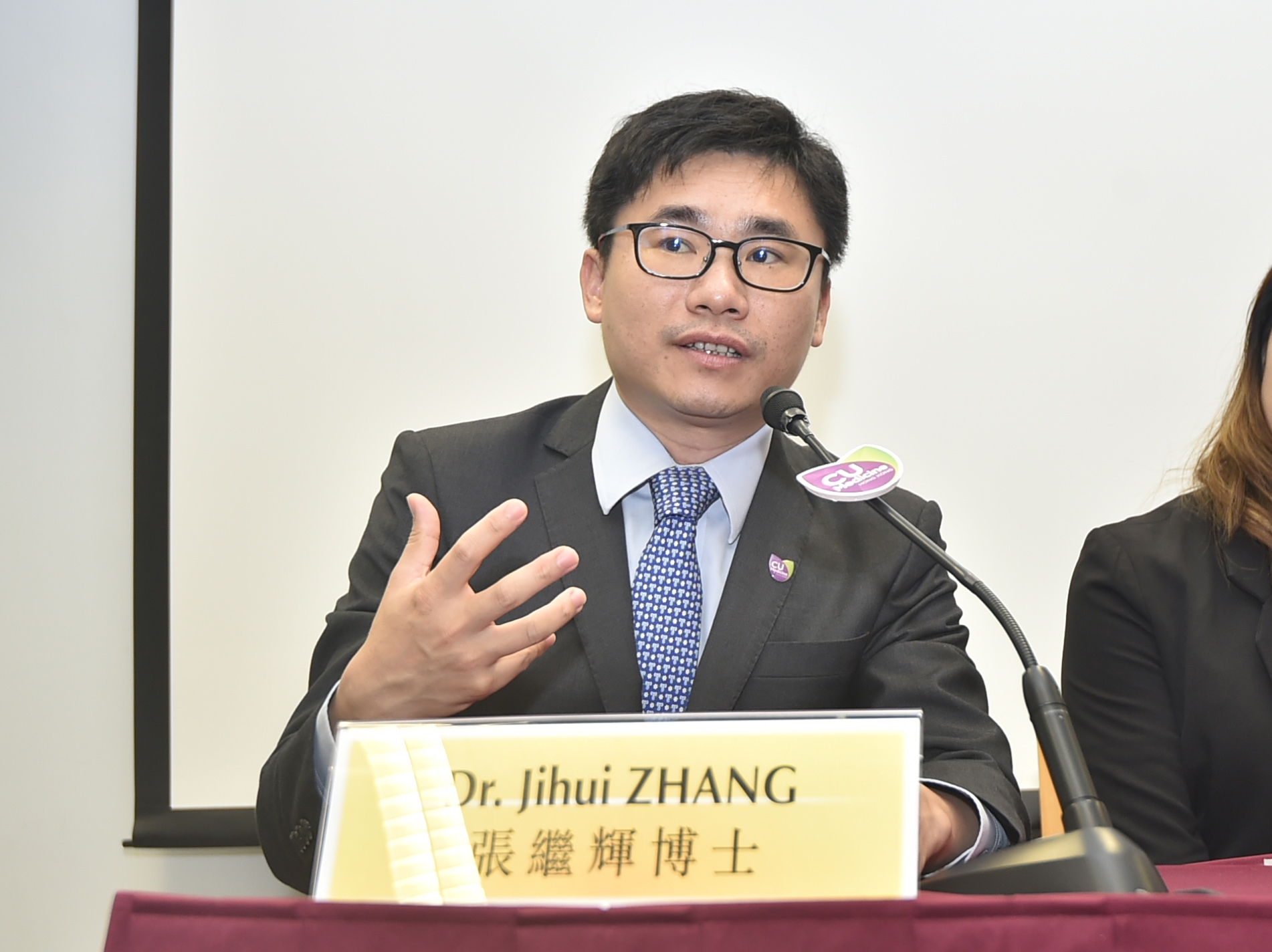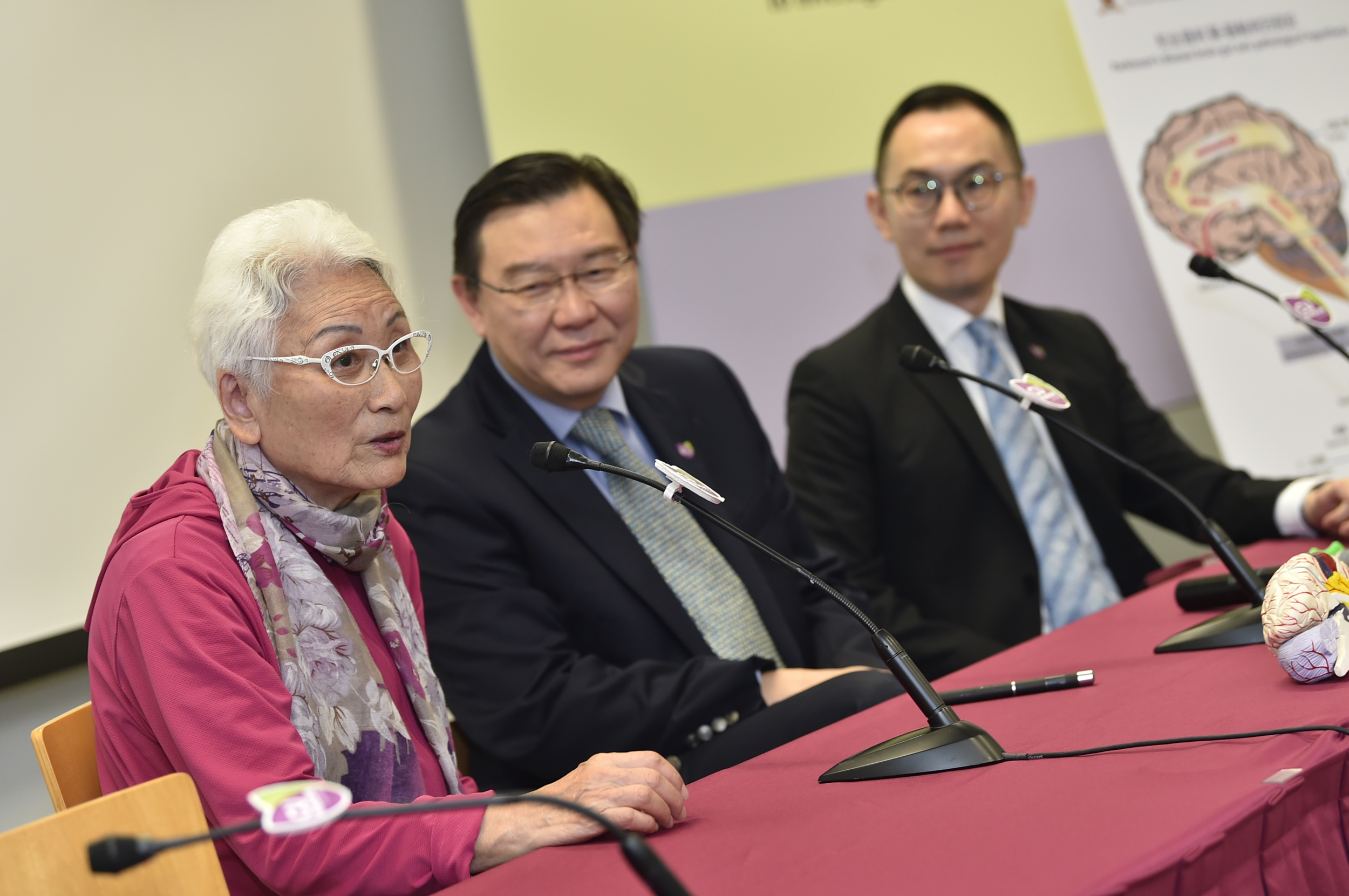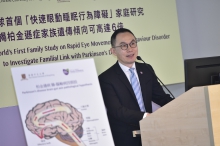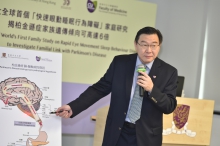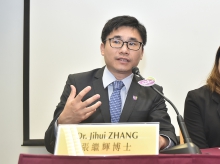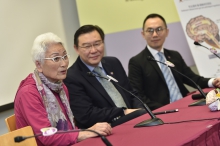CUHK
News Centre
CUHK Conducts World’s First Family Study on Rapid Eye Movement Sleep Behaviour Disorder to Investigate Familial Link with Parkinson’s Disease
The Faculty of Medicine of The Chinese University of Hong Kong (CUHK) conducted the world’s first rapid eye movement sleep behaviour disorder (RBD) family study to systematically investigate the links with first-degree relatives on Parkinson’s disease (PD) and other neurodegenerative diseases. Results showed that the first-degree relatives of RBD patients are at 3-6 times greater risk of having PD and other neurodegenerative diseases than general families and suggested a number of biomarkers to help future diagnosis and treatment. By tracking early symptoms such as constipation, the intervention for PD could be brought forward by 20 years. The findings have been published in an international journal Annals of Neurology on 18 March.
90% of RBD sufferers show symptoms of PD or other neurodegenerative diseases in 5-15 years
PD is the second commonest neurodegenerative disease across the world, with about 12,000 sufferers in Hong Kong. RBD seems to be a major pre-clinical marker of PD. RBD is a sleeping disorder related to a lack of muscle atonia during rapid eye movement sleep (when dreaming occurs). Patients act out their dreams and these dream enactment behaviours consist of a constellation of features including shouting, punching, kicking, and rolling, leading to sleep related violence and injuries.
Dr. Joyce Siu Ping LAM, Honorary Clinical Assistant Professor, Department of Psychiatry, Faculty of Medicine, CUHK explained, “RBD not only will lead to sleep-related injury to patients or bedpartners. It is shown that 90% of the patients will eventually develop Parkinson’s disease symptoms at some point 5 years after they are diagnosed RBD, a marker for neurodegeneration. About 1-2% of people over 60 in Hong Kong are suffering from this sleep problem. Since it is a relatively ‘young’ disease, the general public and even healthcare workers have inadequate awareness of this problem. Currently, the sleep related symptoms can be well managed with medications but we are still far from finding evidence of ways to slow down the progress of neurodegeneration among these patients.”
Professor Vincent Chung Tong MOK, Mok Hing Yiu Professor of Medicine and Head of Division of Neurology, Department of Medicine & Therapeutics, Faculty of Medicine, CUHK remarked, “The ageing population results in a more pressing need for medical support for neurodegenerative disease. Neurodegenerative diseases, such as PD and dementia, are generally diagnosed by using clinical symptoms. The pathological damage of neurodegenerative diseases may have started 10 years or more before the presence of significant clinical symptoms. The damage inside the brain could be very significant and not likely to be reversible. If we can start screening high-risk individuals with RBD or with other markers related to neurodegenerative diseases, we may be able to intervene at the early stage of neurodegeneration.”
First-degree relatives of RBD patients are at 3-6 times greater risk of having PD
The Departments of Psychiatry and the Department of Medicine and Therapeutics of the Faculty of Medicine at CUHK, in collaboration with Sichuan University, the Department of Psychology at the University of Hong Kong, and McGill University in Canada, conducted the world’s first family study of RBD by utilising a most comprehensive measure with detailed clinical and sleep investigations. The study investigated the familial link and aggregation of the disease, also its influence on neurodegeneration. The study involved 102 RBD patients and 89 healthy individuals and their 791 first-degree relatives, including parents, siblings and offspring.
This study found that the first-degree relatives of RBD patients were 3-6 times more likely to suffer from a series of problems related to neurodegeneration, including RBD diagnosis, PD, and dementia than the first-degree relatives of the healthy controls. The study also found that unaffected first-degree relatives (those without definite RBD diagnosis) carried more early signs of neurodegeneration, such as constipation (defined as a frequency of less than two times per week) and subtle motor dysfunction.
|
|
First-degree relatives of RBD patients |
First-degree relatives of healthy controls |
|
Incidence rate of probable RBD |
14.9% |
4.9% |
|
Incidence rate of RBD |
8.4% |
1.4% |
|
Incidence rate of PD |
3.1% |
0.5% |
|
Incidence rate of dementia |
7.2% |
2.6% |
Dr. Jihui ZHANG, Assistant Professor, Department of Psychiatry, CUHK, said “We confirmed RBD has a
significant familial aggregation. The first-degree relatives of RBD patients carry a higher risk of alpha-synucleinopathy (such as PD) in terms of neurodegenerative diseases and prodromal markers. A family study helps identify pre-morbid conditions from this high-risk group and so find out genetic and environmental risk factors and biomarkers.”
Professor Yun Kwok WING, Chairman, Department of Psychiatry, Faculty of Medicine, CUHK remarked, “PD is a multi-system problem and the microbiome in the gut may be the root of it. Constipation is a pre-clinical symptom of RBD and it could take 20 years to proceed to PD. The family members of RBD patients should be considered as a high-risk group and need monitoring for further neurodegeneration. The mapping of progression from the prodromal stage to a full-brown PD has provided an extremely important foundation for us to develop targeted preventive strategies in the future, and ideally to push forward the intervention by 20 years. Our team will adopt genetics, neuroimaging, neuroimmunology, and microbiota to understand the pathogenesis of neurodegeneration through large-scale and in-depth researches, and ultimately we hope to apply the findings to practice for the prevention and treatment of neurodegeneration.”
CUHK Faculty of Medicine conducts the world’s first RBD family study and finds that the first-degree relatives of RBD patients are at 3-6 times greater risk of having Parkinson’s disease and other neurodegenerative diseases than general families. (From right: Professor Vincent Chung Tong MOK, Mok Hing Yiu Professor of Medicine and Head of Division of Neurology, Department of Medicine and Therapeutics, and Professor Yun Kwok WING, Chairman, Dr. Joyce Siu Ping LAM, Honorary Clinical Assistant Professor and Dr. Jihui ZHANG, Assistant Professor from the Department of Psychiatry, Faculty of Medicine, CUHK)
Professor Vincent MOK says that early intervention of neurodegeneration can be achieved by screening high-risk individuals with RBD or with other markers related to neurodegenerative diseases.
Professor Yun Kwok WING says that the mapping of progression from the prodromal stage (such as constipation) to a full-brown PD has provided an important foundation to develop targeted preventive strategies in the future, and ideally to push forward the intervention by 20 years.
Dr. Jihui ZHANG says that a family study helps identify pre-morbid conditions from this high-risk group and so find out genetic and environmental risk factors and biomarkers.


